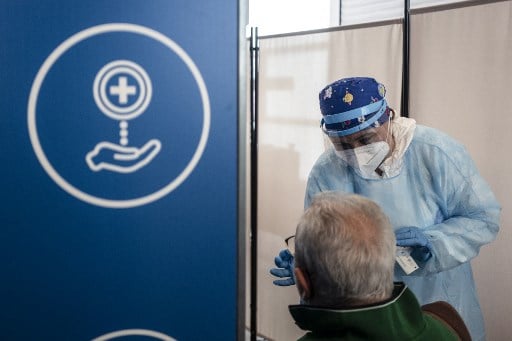Spahn raised hopes on Thursday when he announced that Covid vaccines would be open to adults from June. At the moment Germany follows a strict priority list on who can get the jab first, mainly based on age, health conditions and their line of work.
However, on Friday during a press conference he urged residents to remain realistic.
Spahn said the plan is to lift the priority list in June, opening vaccine appointments out to all adults – but it might not happen at the beginning of the month.
And he added: “This doesn’t mean that we’ll then be able to vaccinate everyone in June.”
READ ALSO: Germany expects to offer all adults a Covid jab ‘by June’
Angela Merkel’s chief of staff, Helge Braun, had also urged people not to have too high expectations. He told the Augsburger Allgemeine newspaper that there will still be long waiting times for appointments because there won’t be enough vaccine doses.
However, the goal is still for every adult to be offered a Covid vaccine by September 21st.
As of Friday a total of 18.5 million people in Germany – around 22.2 percent – had received at least one dose of a Covid vaccine. Around 7.8 percent of the population has been fully inoculated.
Vaccination summit to discuss privileges
On Monday, a meeting between the Chancellor’s Office and the state premiers will take place to discuss the way forward on opening up vaccines to the population in Germany.
It comes after four German states – Bavaria, Berlin, Saxony and Mecklenburg-Western Pomerania – removed their priority list for the AstraZeneca vaccine, opening it up to all adults (not just over 60s) as long as the patient has a consultation with a doctor.
Green Party health expert Janosch Dahmen, told the FAZ newspaper that he saw the actions of the states as “another sign of the disintegration of the federal government’s crisis management”.
Other states such as North Rhine-Westphalia, Hesse, Rhineland-Palatinate, Schleswig-Holstein, Baden-Württemberg and Lower Saxony say that they are not going down this route.
Another topic at the summit will be privileges for vaccinated people. According to Spahn, there will probably be no entitlement that allows restaurants to open up for vaccinated people, for example. He also doesn’t think inoculated people will be exempt from curfews.
However, Spahn said he’s not sure what the final decisions will be.
‘Stand together’
Germany this week brought in controversial changes to the Infection Protection Act. The law prescribes for ’emergency brake’ measures, such as curfews and stricter shutdowns, to come into force in districts and cities with high Covid rates.
READ ALSO: Germany’s new emergency brake Covid measures to come into force on Saturday
Spahn urged people to remember why the country needed tougher measures. There are many hospitals in Germany where the workload is very high, especially for staff, he said.
Lars Schaade, vice-president of the Robert Koch Institute, called for people to stick to the restrictions. “These weeks are difficult for all of us, so it is all the more important that we all stand together as a society,” said Schaade.
The number of new infections is rising, especially in the 30-59 age group. This group, like young people, has not yet been vaccinated for the most part.
But even for younger and healthy people, “this virus is not harmless”, said Schaade. “Severe courses can also occur in younger people.”
He added that recent studies show 10 percent of those infected developed long Covid symptoms.
READ MORE: Where are Covid-19 cases going up (and down) in Germany?
On Friday Germany logged 27,543 coronavirus cases within the last 24 hours, and 265 deaths. The nationwide 7-day incidence increased to 164.




 Please whitelist us to continue reading.
Please whitelist us to continue reading.
Spahn? It is really hard to remain realistic when Germany is lagging so severely behind a number of countries. Faith is diminishing in the Government in vaccinating it’s population.